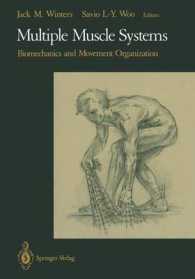- ホーム
- > 洋書
- > 英文書
- > History / World
Full Description
Both the Christian Bible and Aristotle's works suggest that water should entirely flood the earth. Though many ancient, medieval, and early modern Europeans relied on these works to understand and explore the relationships between water and earth, sixteenth-century Europeans particularly were especially concerned with why dry land existed. This book investigates why they were so interested in water's failure to submerge the earth when their predecessors had not been. Analyzing biblical commentaries as well as natural philosophical, geographical, and cosmographical texts from these periods, Lindsay Starkey shows that European sea voyages to the southern hemisphere combined with the traditional methods of European scholarship and religious reformations led sixteenth-century Europeans to reinterpret water and earth's ontological and spatial relationships. The manner in which they did so also sheds light on how we can respond to our current water crisis before it is too late.
Contents
Introduction: Why Water?
Chapter 1: Athens and Jerusalem on Water
Part I: Water in Exegetical, Natural Philosophical, Cosmographical, and Geographical Texts from circa 1000-1600
Chapter 2: Gathering Water in Exegetical Texts
Chapter 3: Defining Water in Natural Philosophical Texts
Chapter 4: Describing and Depicting Water in Cosmographical and Geographical Texts
Part II: Why Water
Chapter 5: Water in Newly Rediscovered Ancient and Medieval Texts
Chapter 6: Exploring the Created Universe through Water
Chapter 7: Sea Voyages and the Water-Earth Relationship
Afterword: The Redefinition of the Universe and the Twenty-First-Century Water Crisis
Bibliography
Index







